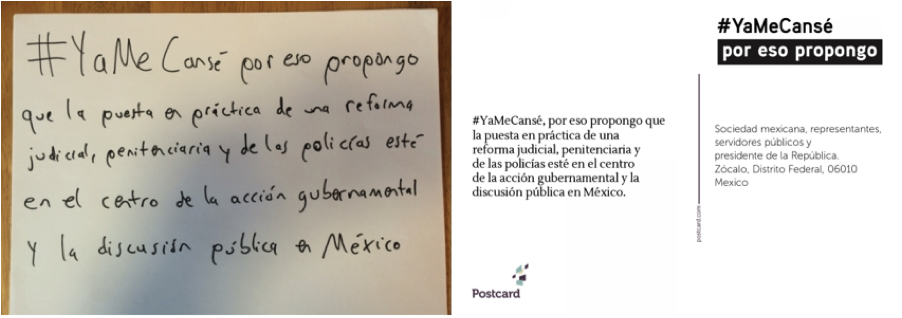Translated by Paulina Suárez-Hesketh
The Ayotzinapa case (in which 43 students were disappeared by local government forces in the city of Iguala, Mexico) has galvanized an unexpected amount of social energy in Mexico. The healthy civic agitation that followed the case, along with the countless expressions of protest and dissatisfaction, reveal the desires of a large portion of the Mexican people to become further engaged with the public sphere.
The revitalization of social consciousness and the meaning of public life have resulted in an unexpected effervescence of ideas and proposals that trace alternate routes for Mexico’s future. One such idea, Ya Me Cansé, Por Eso Propongo (I’m Fed Up, Hence I propose) offers citizens a platform through which to channel this energy.
The initiative Ya Me Cansé, Por Eso Propongo seeks to reinforce ties of solidarity between Mexican citizens through the collective re-articulation of popular political imagination. The project invites people to create a postcard that proposes how to transform the country for the better. A few of weeks from now, the postcards will be printed and exhibited at public events. Each and every one of the messages will be delivered to authorities.

Humbero Beck’s postcard for #YaMeCansé, Por Eso Propongo. Image courtesy of Humberto Beck.
A quantitative and qualitative analysis of the proposals conducted by a team of experts will identify recurring themes, and the result will be a document that defines a public agenda for present-day Mexico.
What is the point of proposing concrete ideas in an environment so dominated by dissatisfaction with all sectors of government? While the explosion of discontent is itself a goal, the expression of ideas represents a different stage of the movement, as it prepares the ground for citizens’ assessment of the current exercise of power in Mexico. Formulating proposals is a crucial part of politics—a mode of democratic participation as legitimate (and necessary) as the casting of a vote on election day. Conceiving and communicating a proposal raises awareness about our place in a wider community—a community that, in order to fully exist, needs the voice of all of its members.
The idea is for the proposals to nurture the current protest movement in Mexico, creating an outlet for dissatisfaction. Ya Me Cansé, Por Eso Propongo is a device that gives citizens the leading role, through which the expression of popular demands is replicated in all possible ways: as a direct questioning of the authorities, as a display of creativity in the public square, as a coordinated series of inquiries that outline the main themes of democratic discussion and social mobilization.
The demands contained in the postcards set a standard against which public opinion can measure our politicians’ actions. Printing and exhibiting the postcards in the public arena is a way to shape broader debates. In this way, propositions don’t cancel the protest movement out, but quite on the contrary: they reproduce one another, becoming more potent and dynamic.
The postcards submitted thus far reveal the contours of our main dissatisfactions and propositions: the categorical rejection of the current Mexican partidocracia (“particracy,” or political parties’ domination of the political process), of a political class insulated by its own privilege, of political power’s obliviousness to popular demands. The proposals insist upon the need to cut public funds that go to individual parties, as well as the salaries of top government employees; they convey the urgent need for an autonomous system of accountability that safeguards public spending and the effective punishment of corruption. One can also discern a pronounced disappointment with the power structure at every level of government, and with the failure of political parties to effectively create an opposition and actual counterweight to the current government in the system of checks and balances.
The proposals convey, in sum, a fatigue with a political class that is perceived to be frivolous and detached from popular problems and demands. In these proposals, one can also perceive a conviction that Mexican democracy is not, in actual terms, a democracy as such. One of the overlapping themes expressed in the postcards is a desire to experience new forms of participation in this democracy, to experiment with modes of vigilance and civilian supervision of governmental activities, and to open the doors to novel political practices in which the expression of widespread concerns is not seen as an aberration amid a purported normalcy, but as a key component of a true democracy.
Another recurring theme is the idea that it will be difficult to move forward without a police force that is trustworthy, well-paid and prepared, and equipped with set protocols of action. The proposals convey a consensus that police reform should involve a transformation of drug policies, the establishment of procedures in the search for desaparecidos (missing persons), the overhaul of the penal and judicial systems, the re-distribution of funds to the health and education sectors, and the creation of new spaces for civilian participation.
Ya Me Cansé, Por Eso Propongo seeks to generate a tidal wave of postcards that will express, in graphic and tangible ways, the intelligence of the crowd—a collective voice that, in its multiplicity, also exhibits points of convergence, commonly-held dissatisfactions, and a shared sense of urgency. The initiative is an exercise in the very attitudes that should lie at the heart of our common experience—the experience that democracy is built by all of us.
To create your own postcard, visit www.poresopropongo.mx and click on “Manda tu Postal.”
To see the postcards created thus far, visit www.poresopropongo.mx.
Originally published in Animal Político, January 22, 2015.
*Paulina Suárez-Hesketh is a doctoral candidate in cinema studies at New York University.



